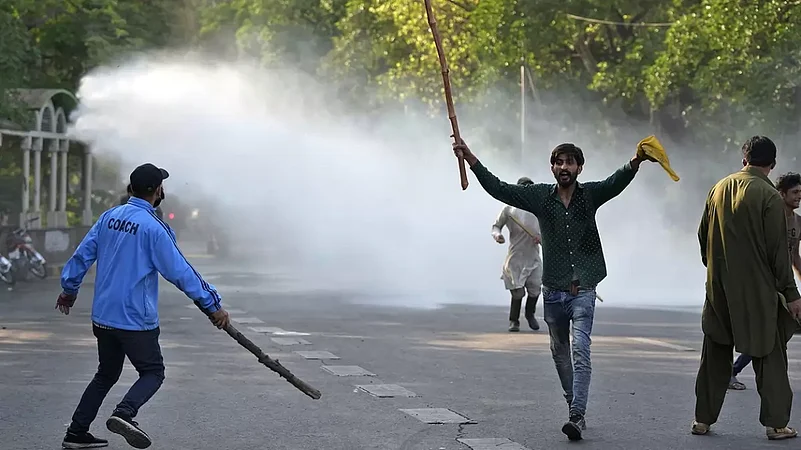In a significant development, Pakistan's National Assembly adopted a resolution on Monday, calling for swift action against a political party and its leader involved in the violent incidents that took place on May 9. The resolution, presented by Defence Minister Khawaja Asif, received majority approval in the lower house, marking yet another blow to former prime minister Imran Khan and his party, the Pakistan Tehreek-e-Insaf (PTI).
Pakistan's National Assembly Demands Swift Action Against Political Party Involved In May 9 Violence
The resolution, presented by Defence Minister Khawaja Asif, received majority approval, dealing another blow to former prime minister Imran Khan and his party, the Pakistan Tehreek-e-Insaf (PTI).

The resolution expressed grave concern over the party's alleged involvement in the attacks on military installations, which resulted in severe damage to state institutions and the country as a whole. While not explicitly naming the PTI, the resolution demanded that appropriate action be taken against all responsible individuals in accordance with the law and the Constitution.
Emphasizing the urgency of the situation, the resolution stressed the need for prompt action against the culprits and highlighted that even the party's workers and leaders were distancing themselves from the violence that occurred on May 9. It further asserted that no violation of human rights had taken place during the subsequent law enforcement actions against the miscreants and criminals involved.
The resolution underscored the authority of the military to respond to attacks on military installations, not only within Pakistan but also worldwide. It called for the punishment of all individuals implicated in the violence under the Pakistan Army Act of 1952, an existing legislation intended to address such situations.
Defence Minister Asif, while speaking in the National Assembly, clarified that no new laws were being created specifically for the perpetrators of the May 9 incidents. He emphasized that existing anti-terrorism laws would be utilized to deal with cases of terrorism, stating, "Where there is terrorism, cases will be dealt with under anti-terrorism laws."
The violent protests on May 9 erupted following the arrest of Imran Khan by paramilitary Rangers in Islamabad. PTI workers resorted to vandalism, targeting more than 20 military installations and government buildings, including the Lahore Corps Commander House, Mianwali airbase, and the ISI building in Faisalabad. Notably, this was the first time that the mob attacked the Army headquarters (GHQ) in Rawalpindi. Imran Khan was subsequently released on bail.
The government and military responded strongly to the violence, pledging to take action against those responsible. As part of the ongoing crackdown, law enforcement agencies have apprehended over 10,000 PTI workers across Pakistan, with 4,000 arrests made in Punjab province alone. To ensure thorough investigations into the attacks and violent protests, the Punjab Home Department has established ten joint investigation teams, given the incident the moniker "Black Day" by the army.
Imran Khan, the 70-year-old chairman of the PTI, is currently facing more than 100 cases across the country, further intensifying the legal challenges he and his party are confronted with.
(With PTI Inputs)



















